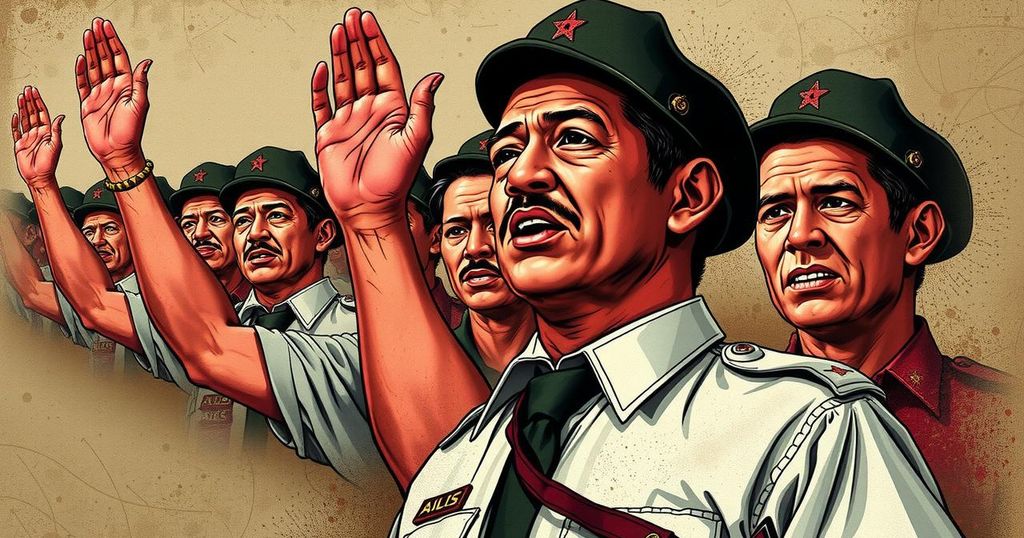The Workers Party marks the second anniversary of the January 8 coup attempt with an event highlighting military collaboration, yet contrasting with historical revolutionary principles. Lula’s rhetoric, framed around national sovereignty, masks underlying social issues and fails to genuinely represent the working class, as political tensions rise amid global right-wing influences.
Wednesday marked the two-year anniversary of the attempted coup on January 8, 2023, spearheaded by former Brazilian President Jair Bolsonaro and segments of the military. The Workers Party (PT) commemorated this event with a ceremony that appeared more reactionary compared to the previous year’s “Democracia Inabalada” event. In attendance were the commanders of the Armed Forces, who reportedly felt uncomfortable and remained silent. President Lula made efforts to align with the military, asserting that the Armed Forces could play a role in defending Brazil’s national sovereignty. Lula’s nationalist rhetoric, however, seeks to obscure significant social divisions within Brazil, echoing slogans from the military dictatorship era that suppressed dissent.
Furthermore, Lula’s alignment with the military is a tactic to mitigate the political crisis engulfing Brazil while presenting the Armed Forces as protectors of democracy. This narrative is at odds with substantial evidence implicating military command in discussions planning the coup against the elected government. Recent arrests of high-ranking military officials, linked to advanced plans to assassinate Lula and key government figures, highlight the severity of the situation. Despite this, Lula characterized the assassination attempt as a product of “irresponsible” individuals, further distorting the reality of the circumstances.
The event also featured Alexandre de Moraes, a Supreme Court judge, who wrongfully attributed the coup attempt to issues surrounding freedom of speech on the internet, advocating for tighter regulations. In a striking portion of his address, Lula juxtaposed idealized democracy against the legacy of revolutionary movements, particularly criticizing the Russian Revolution of 1917 and characterizing it as devoid of workers’ representation. Lula’s own rise to power, emerging alongside significant labor movements, stands in stark contrast to his claims about the nature of democratic governance.
The misrepresentation of revolutionary history was evident as Lula failed to acknowledge any genuine gains made by the Brazilian working class beyond his own political ascension. The ceremony notably lacked attendance from sectors outside the state apparatus, underscoring its disconnectedness from the wider populace. Lula’s remarks on the Russian and Cuban revolutions, while seeking to elevate bourgeois democracy, belied a historical understanding that could not accurately reflect the dynamics that led to those movements.
The broader socio-political landscape sees increasing polarization, exacerbated by the resurgence of global right-wing movements and the ascendancy of figures like Donald Trump, an ally of Bolsonaro. As Bolsonaro seeks to re-enter the political arena in the U.S., diplomatic tensions with the Brazilian government are anticipated. Additional factors, such as pressures from U.S. imperialist ambitions in Latin America and the influence of billionaires aiming to destabilize the political framework, are at play.
The Workers Party’s appeals to military nationalism signify a troubling capitulation to both imperialism and resurgent fascism. Despite past failures, right-wing factions remain poised for potential future actions that are likely to capitalize on favorable conditions. Addressing this threat necessitates a revitalization of the working-class struggle undertaken through an international socialist revolution, adhering to the principles that characterized the October Revolution in Russia and represented by the International Committee of the Fourth International (ICFI).
The article discusses the second anniversary of the January 8, 2023, coup attempt in Brazil, primarily centered around actions led by former President Jair Bolsonaro and military support. The Workers Party (PT) held a commemorative event that aimed to reconcile with military leaders while downplaying the social unrest and political crises affecting Brazil today. It reflects on Lula’s attempts to align himself with the military, a strategy perceived as an effort to legitimize both the military’s role and his own presidency amidst growing tensions and scrutiny, especially in light of international political influences and historical fascist tendencies in Brazil.
In summary, the second anniversary of the coup attempt in Brazil reveals deep political contradictions within the Workers Party’s strategy, emphasizing a troubling alliance with military forces implicated in anti-democratic actions. Lula’s rhetoric, while framing military involvement as a safeguard for democracy, obscures significant social divisions and critiques of historical revolutionary movements. As tensions heighten both domestically and internationally, a renewed focus on working-class solidarity and revolutionary principles is essential to counteract resurgent fascist forces in Brazil.
Original Source: www.wsws.org






